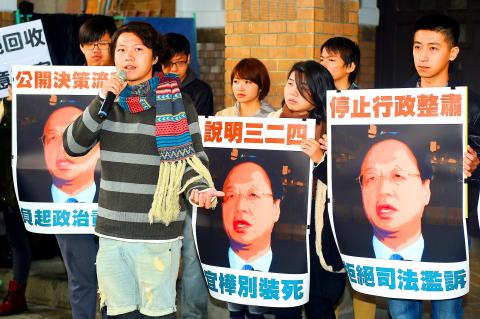A group of students and citizens who participated in the occupation of the plaza of the Executive Yuan and were forcibly ejected by police on March 24 during the Sunflower movement yesterday called on outgoing Premier Jiang Yi-huah (江宜樺) to take responsibility for his part in the violence inflicted upon the protesters before attempting to return to academia.
Jiang, a former political science professor at National Taiwan University, resigned as premier to assume “political responsibility” for the Chinese Nationalist Party’s (KMT) drubbing in Saturday’s nine-in-one elections, but various controversies that occurred during his term have not been straightened out, especially the police’s violent action on March 24, the group said.
They asked that Jiang make public the decisionmaking process that led to the order demanding the forced eviction of protesters.

Photo: Liao Chen-huei, Taipei Times
One of the protesters, surnamed Chiu (邱), told a press conference that he was a witness to and victim of police violence that night.
He said that while the attack might be partly attributed to tensions that had built up between the police and protesters since the Sunflower movement started on March 18, he found it “hard to believe that the commander on the scene would have dared to order the officers to attack the protesters [on his own accord].”
“So the crux lies in the question of which government agency — the Executive Yuan or the National Police Agency — issued the order,” Chiu said, adding that Jiang could not leave his post believing that his conscience is clear without facing the issue.
The group called on all schools in the nation to refuse Jiang any teaching posts after he leaves the Cabinet, “since he is a negative example and has no value to either students or education per se.”
The government not only used unnecessary force and accused the protesters, but it has also continued to “abuse police power and judicial resources to harass people who on March 24 stood up against the government’s black-box [opaque]” handling of agreements with China.
Many of the protesters who filed private prosecutions against the Executive Yuan and the National Police Agency have found themselves defendants after the charges were made in court.
“Even the witnesses who came forward originally to substantiate our charges have been summoned by the police [as defendants],” said Judicial Reform Foundation deputy executive director Chen Yu-fan (陳雨凡), who has been assisting people in making the claims of abuse.
“Documents about private prosecutions provided to the court should not have ended up in the hands of prosecutors,” Chen said.
“We don’t have sufficient evidence to accuse the government of abusing the system and using what we have provided to the court to against us, but what has happened has made us entertain the possibility,” she added.
The group urged incoming premier Mao Chi-kuo (毛治國) to stop employing executive power to abuse the judicial system.

Taiwan is projected to lose a working-age population of about 6.67 million people in two waves of retirement in the coming years, as the nation confronts accelerating demographic decline and a shortage of younger workers to take their place, the Ministry of the Interior said. Taiwan experienced its largest baby boom between 1958 and 1966, when the population grew by 3.78 million, followed by a second surge of 2.89 million between 1976 and 1982, ministry data showed. In 2023, the first of those baby boom generations — those born in the late 1950s and early 1960s — began to enter retirement, triggering

ECONOMIC BOOST: Should the more than 23 million people eligible for the NT$10,000 handouts spend them the same way as in 2023, GDP could rise 0.5 percent, an official said Universal cash handouts of NT$10,000 (US$330) are to be disbursed late next month at the earliest — including to permanent residents and foreign residents married to Taiwanese — pending legislative approval, the Ministry of Finance said yesterday. The Executive Yuan yesterday approved the Special Act for Strengthening Economic, Social and National Security Resilience in Response to International Circumstances (因應國際情勢強化經濟社會及民生國安韌性特別條例). The NT$550 billion special budget includes NT$236 billion for the cash handouts, plus an additional NT$20 billion set aside as reserve funds, expected to be used to support industries. Handouts might begin one month after the bill is promulgated and would be completed within

The National Development Council (NDC) yesterday unveiled details of new regulations that ease restrictions on foreigners working or living in Taiwan, as part of a bid to attract skilled workers from abroad. The regulations, which could go into effect in the first quarter of next year, stem from amendments to the Act for the Recruitment and Employment of Foreign Professionals (外國專業人才延攬及僱用法) passed by lawmakers on Aug. 29. Students categorized as “overseas compatriots” would be allowed to stay and work in Taiwan in the two years after their graduation without obtaining additional permits, doing away with the evaluation process that is currently required,

IMPORTANT BACKER: China seeks to expel US influence from the Indo-Pacific region and supplant Washington as the global leader, MAC Minister Chiu Chui-cheng said China is preparing for war to seize Taiwan, Mainland Affairs Council (MAC) Minister Chiu Chui-cheng (邱垂正) said in Washington on Friday, warning that Taiwan’s fall would trigger a regional “domino effect” endangering US security. In a speech titled “Maintaining the Peaceful and Stable Status Quo Across the Taiwan Strait is in Line with the Shared Interests of Taiwan and the United States,” Chiu said Taiwan’s strategic importance is “closely tied” to US interests. Geopolitically, Taiwan sits in a “core position” in the first island chain — an arc stretching from Japan, through Taiwan and the Philippines, to Borneo, which is shared by